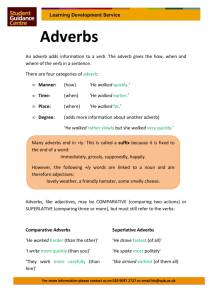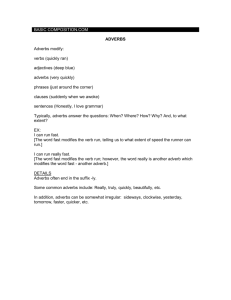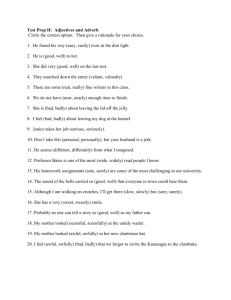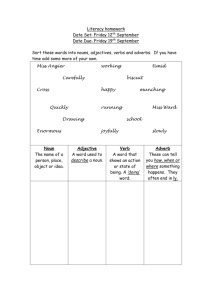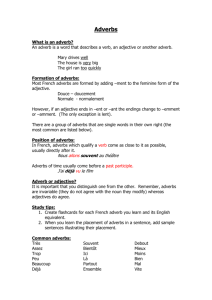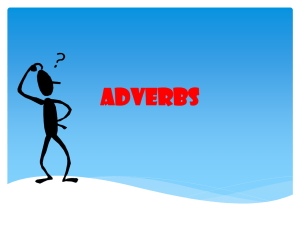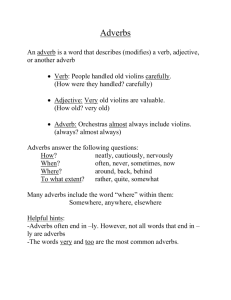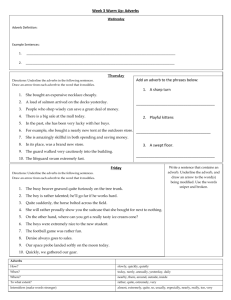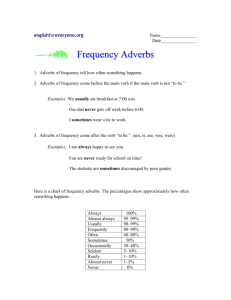BEGINNER_LEVEL_LECTURE_
advertisement
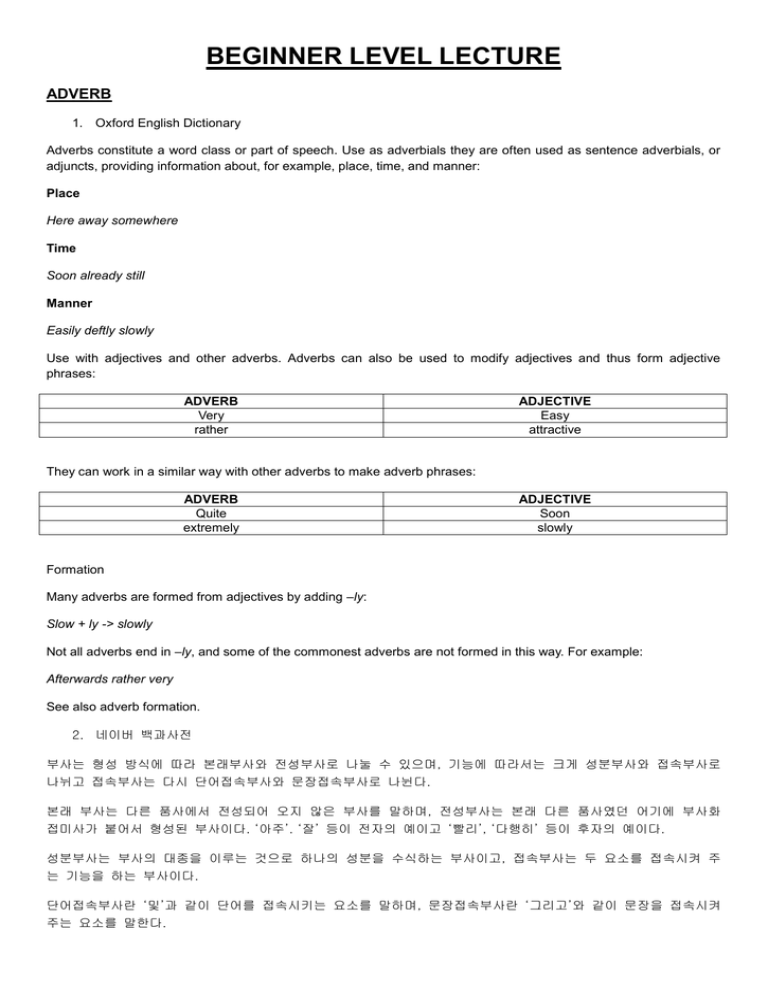
BEGINNER LEVEL LECTURE ADVERB 1. Oxford English Dictionary Adverbs constitute a word class or part of speech. Use as adverbials they are often used as sentence adverbials, or adjuncts, providing information about, for example, place, time, and manner: Place Here away somewhere Time Soon already still Manner Easily deftly slowly Use with adjectives and other adverbs. Adverbs can also be used to modify adjectives and thus form adjective phrases: ADVERB Very rather ADJECTIVE Easy attractive They can work in a similar way with other adverbs to make adverb phrases: ADVERB Quite extremely ADJECTIVE Soon slowly Formation Many adverbs are formed from adjectives by adding –ly: Slow + ly -> slowly Not all adverbs end in –ly, and some of the commonest adverbs are not formed in this way. For example: Afterwards rather very See also adverb formation. 2. 네이버 백과사전 부사는 형성 방식에 따라 본래부사와 전성부사로 나눌 수 있으며, 기능에 따라서는 크게 성분부사와 접속부사로 나뉘고 접속부사는 다시 단어접속부사와 문장접속부사로 나뉜다. 본래 부사는 다른 품사에서 전성되어 오지 않은 부사를 말하며, 전성부사는 본래 다른 품사였던 어기에 부사화 접미사가 붙어서 형성된 부사이다. ‘아주’. ‘잘’ 등이 전자의 예이고 ‘빨리’, ‘다행히’ 등이 후자의 예이다. 성분부사는 부사의 대종을 이루는 것으로 하나의 성분을 수식하는 부사이고, 접속부사는 두 요소를 접속시켜 주 는 기능을 하는 부사이다. 단어접속부사란 ‘및’과 같이 단어를 접속시키는 요소를 말하며, 문장접속부사란 ‘그리고’와 같이 문장을 접속시켜 주는 요소를 말한다. 한편 접속부사를 부사에서 독립시켜 따로 접속사라는 품사를 설정하기도 한다. 부사는 주로 용언을 수식하나 ‘아 주 잘’에서처럼 다름 부사를 수식하기도 하며, ‘바로 여기’에러처럼 체언을 수식하는 경우도 있다. 3. The Frameworks of English Just as adjectives are less central than nouns and verbs, so adverbs are less central than the other three open classes. In fact, they are a very diverse group and this can make them difficult both to define and to identify. We have to identify adverbs by looking at several features which characterize them – although not all these features will apply to all adverbs. Like adjectives, many adverbs have a describing purpose in a sentence and adverbs have other features in common with adjectives too. You can check whether a word is an adjective or adverb by seeing which position it can appear in. If the word cannot appear in attributive position then it is an adverb. The lovely hotel The careful person * The carefully person Adjective Adjective Adverb Adverbs have the ability not only to give information about, amongst other things, how, where and when, but also to allow you to comment on whole utterances. For instance: Fortunately, comment Today the dog has eaten his food when quietly Outside. how Where You will see that two of the adverbs in this sentence – fortunately and quietly – end in –ly. This typifies many adverbs particularly of the ‘comment’ and ‘how’ types. In the example Fortunately today the dog has eaten his food outside, you may notice that adverbs seem to be less central elements in a sentence. If you stripped the adverbs away from the example, the essence of the sentence – the dog has eaten his food – still remains. Only occasionally are adverbs crucial to the completion of a sentence’s meaning. Adverbs can be divided into three subclasses – adjuncts, conjuncts and disjuncts. The first subclass, adjuncts, is by far the largest. Adjuncts have a certain amount in common with adjectives and might be considered their first cousins: The careful surgeon completed the operation The surgeon completed the operation carefully Adjective Adverb (adjunct) What careful and carefully have in common in these two examples is their ability to provide more information – about the surgeon in the first example and about how the surgeon performed the operation in the second example. The meanings of these two sentences are clearly closely linked (we would expect a careful surgeon to operate carefully) but not identical. Further, an important difference between the adjective in the first sentence and the adverb in the second is that the adjective careful can only appear in this sentence in its given position preceding surgeon whereas the adverb carefully could appear in any one of several positions: The surgeon completed the operation carefully Carefully, the surgeon completed the operation The surgeon carefully completed the operation ? The surgeon completed carefully the operation An adverb such as carefully is typical of many adverbs in the adjunct subclass in that it modifies information given by one or more of the other elements. In terms of their meaning, adverbs which are adjuncts provide us with information about how, where, when and to what extent. Adverbs which tell us how are adverbs of manner: The surgeon completed the operation carefully Silently, Arusha observed what Dave was doing Adverbs of place indicate location or direction: Put the parcel here She turned the key clockwise Location direction Adverbs of time denote when something happened, how long it lasted or how often it happened: Someone saved my life tonight The symphony lasted forever He telephoned her nightly When How long How often Adverbs of degree indicate extent, including whether a piece of information applies to more than one item: She found her job particularly difficult in the winter She ignored him at the party simply to make a point She loved him, and he loved her too Some of the adverbs of degree form a further subset of intensifiers. The adverb particularly in the set of examples above is an intensifier: it indicates a point on an imagined scale and can therefore be contrasted with other intensifiers: She found her job particularly / somewhat / fairly / slightly difficult… You can see from the examples of the different types of adjuncts that adverbs can appear both before and after items which they qualify, although there are restrictions on this. Conjunctions and disjuncts often have more flexibility of position than many adjuncts as their functions are essentially different. Sometimes adjuncts are wh-words. A wh-word is – unsurprisingly – one which begins with wh-although how and however are also included in the wh-group. Examples of wh-adverbs include how, when, where and why. They often take the place of a regular adverb in a question, although they can occur in other constructions. In addition to replacing simply another adverb, they can also take the place of a larger unit such as a phrase or a clause. The surgeon performed the operation carefully The surgeon performed the operation with great care How did the surgeon perform the operation? He telephoned her nightly He telephoned her every night When did he telephone her? How often did he telephone her? She fell asleep outside She fell asleep on the sofa Where did she fall asleep? She went to France to buy some champagne Why did she do to France? Adverb Phrase Adverb Phrase Adverb Phrase clause Further uses of wh-adverbs, as well as larger units such as phrases and clauses are explored in Part III. Adverbs which are adjuncts give additional information either about a particular element of a sentence or about the event referred to in a sentence. In this respect they contrast with disjuncts and conjuncts which relate only to complete sentences and do not give information as such. One function of disjuncts is to comment on what is being said: Obviously, I should have told her what happened (It is obvious that I should have told her …) Probably, I should have told her what happened (It is probable that I should have told her …) A further function of disjuncts is to indicate the ‘voice’ in which something is said: Frankly, I should have told her what happened (I am being frank when I say I should have told her what happened) Confidentially, I think she will lose her job (I am being confidential when I say I think she will lose her job) Whereas disjuncts relate to the sentence in which they occur (or possibly to just part of it if it is a complex sentence), conjuncts relate one sentence or one part of a sentence to another. They include adverbs such as moreover, therefore, however and nevertheless. If one of these conjuncts appeared in an isolated sentence it would seem slightly strange: They decided to go for a picnic nevertheless The presence of nevertheless here implies the existence of a previous statement indicating that a picnic was not a good idea: 1. It looked as if it might rain 2. They decided to go for a picnic nevertheless A conjunction therefore has the property of linking two sentences together. It could also link two parts of the same sentence: She wasn’t free to go to New York at Christmas and besides she couldn’t afford it. The adverbs here are not central to the structure of the sentence. Only occasionally are adverbs crucial to the completion of a core sentence.
